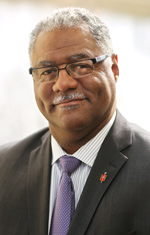By JULIUS C. TRIMBLE
Guest Columnist
 As a Christian leader, I bear a profound obligation and responsibility to oppose antisemitism whenever and wherever it occurs. As an African American United States citizen, I refuse to be ambiguous or approach this commitment to stand against violence and hatred directed toward Jewish people as somehow a binary choice or a denial of suffering of some over others. Injustice anywhere and hatred directed toward any people are a threat to the whole of the human family.
As a Christian leader, I bear a profound obligation and responsibility to oppose antisemitism whenever and wherever it occurs. As an African American United States citizen, I refuse to be ambiguous or approach this commitment to stand against violence and hatred directed toward Jewish people as somehow a binary choice or a denial of suffering of some over others. Injustice anywhere and hatred directed toward any people are a threat to the whole of the human family.
While the term antisemitism is used to address both attitudes expressed and acts of hatred and violence, it is experienced as expressed prejudice against Jews.
Reported acts of antisemitism and violence against Jewish people have been documented and are on the rise. Protests on college campuses and the aftermath of the attack by Hamas on Oct. 7, followed by Israeli military response in Gaza, has elevated pain and suffering to the world’s stage for all to see.
Lost in the debates and devastating humanitarian crisis is the decades-long commitment of many people in the Jewish and Palestinian communities who have labored together to charter a peaceful future for all the people who call the Holy Land their home. As a United Methodist Christian, I am aware that Christians, too, have been complicit in antisemitism, Islamophobia, and the marginalization of peoples we choose, at times, to segregate by culture, race, language, or religion.
A resolution dating back to 2016 by The United Methodist Church on Christian Jewish Relations still has merits for our challenge today: “As followers of Jesus Christ, we deeply repent of the complicity of the Church and the participation of many Christians in the long history of persecution of the Jewish people. It is our responsibility as Christians to oppose antisemitism whenever and wherever it occurs.”
As my Jewish neighbors celebrate Hanukkah, I pray for safety and peace in their homes and places of worship, the safety that has eluded thousands who are on the move across the globe in search for sanctuary and safety.
As I celebrate Advent and the days and nights leading up to Christmas, I recognize that we all share one planet, and our religious and ethnic identities cannot excuse us from the work that will yield a world free from the grip of hatred and violence.
It is indeed the peacemakers who will be called the children of God (Matthew 5:9). In the words of the Gospel song by Rev. Hezikiah Walker, “I won’t harm you with words from my mouth, I love you, I need you to survive.”
We need each other to build the world with a landscape of peace and justice for all.
Julius C. Trimble is the Resident Bishop of the Indiana Conference of The United Methodist Church.

